Japan's Official Development Assistance White Paper 2013
Section 2 Measures for Each Priority Issue
Poverty Reduction, Sustainable Growth, Addressing Global Issues, and Peace-Building are positioned as the four priorities in the ODA Charter. This section introduces Japan’s recent efforts in relation to these challenges.
1. Poverty Reduction
(1) Education
Education plays an important role in the socio-economic development that is needed for poverty reduction. It also enables individuals to develop their own potentials and capabilities, as well as to live with dignity. Education fosters understanding towards other people and different cultures, and forms the foundation for peace. However, across the world approximately 57 million children are still out of school. Approximately 800 million adults do not have minimum literacy (the ability to read and write short, simple sentences), two-thirds of which are women. (Note 1) In order to improve this situation, the international community has been working to achieve Education for All (EFA)*. In September 2012, the UN Secretary-General announced the Education First* initiative and called for the efforts of the international community to promote the spread of education.
<Japan’s Efforts>
Emphasizing “nation-building” and “human resource development,” Japan has been providing developing countries with a broad range of support for education, including the enhancement of basic education*, higher education, and vocational training. In 2002, Japan announced the “Basic Education for Growth Initiative (BEGIN)”. In accordance with BEGIN, Japan provides assistance that combines the equipment and facilities aspect, such as constructing schools, with the knowledge and expertise aspect, such as training of teachers, with priority emphasis on (i) ensuring access to education,
(ii) improving the quality of education, and
(iii) improving education policies and educational administration systems.
In 2010, Japan released the “Japan’s Education Cooperation Policy 2011-2015,” as its new education cooperation policy to be implemented from 2011 through 2015, the target date to achieve EFA and the Millennium Development Goals (MDGs). (Goal 2: Achieve universal primary education, Goal 3: Promote gender equality and empower women.) The new policy promises that over five years from 2011 Japan will provide $3.5 billion, focusing on (i) basic education;
(ii) post-basic education (secondary education following the completion of primary education, vocational training and education, higher education); and (iii) education for vulnerable countries affected by conflicts or disasters. Japan aims to establish quality educational environment, paying particular attention to alienated children as well as vulnerable countries, and other areas where it is difficult to deliver the assistance, and has been providing aid to enable individuals who have completed primary education to continue further education. Through this assistance, at least 7 million children will be able to enjoy the high-quality educational environment. In addition, Japan has proposed “School for All,” a basic educational aid model that is designed to provide access to quality education for all children. As part of its new policy, working together with schools, local communities, and governments, Japan is engaged to improve the learning environment in a variety of aspects such as (i) quality education (improving the quality of teachers, etc.); (ii) safe learning environment (provision of school facilities, health and sanitation); (iii) school based management; (iv) schools open to the local community; and (v) inclusive education for children disadvantaged in attending school due to poverty, gender discrimination, disability, and others. At the breakout session for education at the MDGs Follow-up Meeting held in Tokyo in June 2011, the theme of improving quality of education was discussed and compiled an outcome document with good practices.
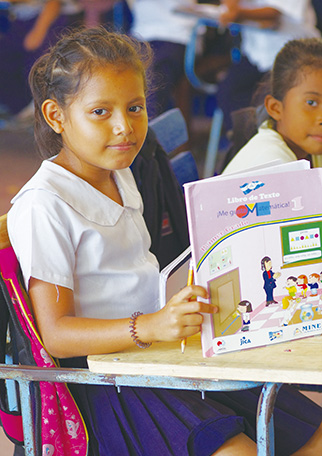
Nicaraguan children with math textbooks that were developed through support from Japan. (Photo: Kohei Nakayama)
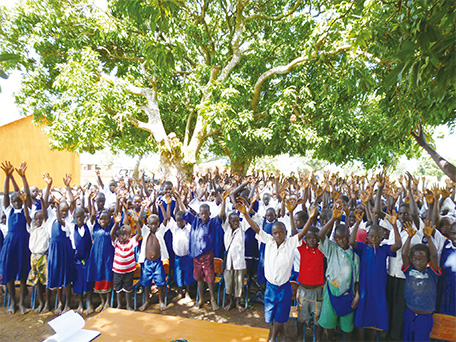
Awiri Primary School in Dokolo district in Northern Uganda. A new classroom building was completed through support from Japan. (Photo: Chieko Nakayama / Embassy of Japan in Uganda)
Also, Japan has been an active participant in the efforts to discuss and reform the Global Partnership for Education (GPE)* (formerly known as FTI: Fast Track Initiative), which lays out the international framework for achieving universal primary education by 2015. Japan served as a co-chair and a member of the Steering Committee since January 2008, due to its G8 presidency and also served as a director in 2012. Further, Japan’s contributions to GPE-related funds from FY2007 to FY2012 totaled approximately $16 million.
As initiatives for Africa, at the Fourth Tokyo International Conference on African Development (TICAD IV) in May 2008, Japan announced that it would implement the construction of 1,000 primary/secondary schools and 5,500 classrooms, provide support for the capacity building of 100,000 math and science teachers, and extend support for school management improvements at 10,000 schools over the course of five years starting in 2008. As of March 2013, 1,319 primary/secondary schools with 7,161 classrooms have been constructed, support for capacity building has been provided to approximately 800,000 math and science teachers, and school management improvement projects have been implemented at 19,904 schools. Thus, Japan achieved its goals. At the Fifth Tokyo International Conference on African Development (TICAD V) in June 2013, Japan announced that it would provide high-quality educational environments for additional 20 million children over the course of five years starting in 2013, through the expansion of support for math and science education improvement and school management improvement projects.
Furthermore, in order to help improve the substance and quality of education in the Asia-Pacific region, Japan is contributing to a trust fund to the United Nations Educational, Scientific and Cultural Organization (UNESCO) to implement projects for improving the management capacity of community learning centers.
Afghanistan is a country with an estimated illiterate population of approximately 11 million (about 40% of the population) due to the impact of about three decades of civil war. The government of Afghanistan aims to provide 3.6 million people with literacy education by 2014. Since 2008, Japan is contributing to the promotion of literacy education in Afghanistan with a total of approximately ¥5.3 billion in grant aid through the UNESCO to provide literacy education to 1 million people in 100 districts of 18 provinces of Afghanistan.
In recent years, Japan has been promoting transnational networking of higher education institutions and joint research projects among neighboring countries. Japan also supports human resource development in developing countries by various measures such as accepting international students to Japanese institutions of higher education in accordance with the “300,000 International Students Plan.”
In addition, Japan strives to make it easier for Japanese in-service teachers to go overseas as Japan Overseas Cooperation Volunteers (JOCV) under the Special Program for School Teachers*. In-service teachers dispatched to developing countries contribute to education and social development in their dispatched countries, and make use of their experiences in the field of Japanese education after their return.
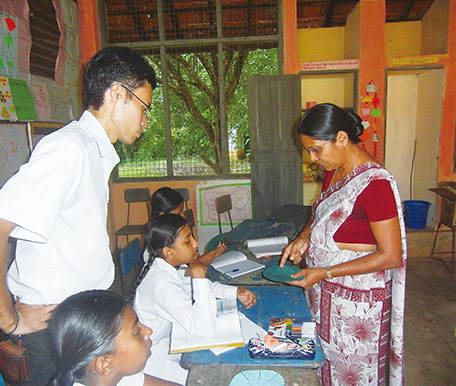
A Japan Overseas Cooperation Volunteer working for school education in Sri Lanka. He visits schools to advise local teachers on teaching methods. (Photo: Yuka Okada)
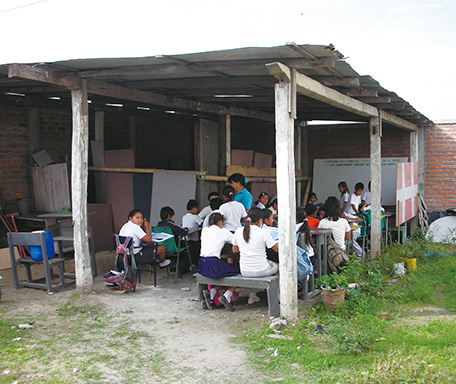
A classroom scene of a primary school in Santa Rosa City, El Oro province, Ecuador. Japan will provide support to build classrooms. (Photo: Nobue Hanzawa / Embassy of Japan in Ecuador)
Glossary
- *EFA: Education for All
- Education for All (EFA) is an international movement that aims at ensuring everyone in the world has the opportunity to receive at least a basic education. The five main organizations involved in EFA are the United Nations Educational, Scientific and Cultural Organization (UNESCO), the World Bank, the United Nations Development Programme (UNDP), the United Nations Children’s Fund (UNICEF), and the United Nations Population Fund (UNFPA), with UNESCO serving as the overall coordinator.
- *Education First
- An initiative on education announced by the UN Secretary-General in September 2012. Laying foundations for the fundamental right of education in social, political, and developmental agendas, it promotes international efforts intended to spread education. In particular, it prioritizes school attendance of all children, the improvement of education quality, and fostering global citizenship for the individuals to participate actively in the efforts to tackle global issues.
- *Basic education
- Educational activities designed to enable individuals to acquire the knowledge, value, and skills needed to live. Basic education mainly refers to primary education, lower secondary education (equivalent to the Japanese junior high schools), pre-school education, and adult literacy education.
- *GPE: Global Partnership for Education
- A framework, for international cooperation established under the leadership of the World Bank in 2002, in order to achieve universal primary education by 2015 that is included in the MDGs and the EFA Dakar Framework for Action (formerly known as FTI: Fast Track Initiative).
- *JOCV under the Special Program for School Teachers
- The program is designed to encourage in-service teachers to participate in international cooperation. Teachers who are recommended by the Ministry of Education, Culture, Sports, Science and Technology (MEXT) to JICA are exempt from the preliminary technical test, and the period of dispatch is set for two years (compared to the usual cases which are for two years and three months), beginning in April and ending in March, to match the Japanese school year.
Note 1: Source: “The Millennium Development Goals Report 2013” (the United Nations) and “EFA Global Monitoring Report 2012” (UNESCO)
●South Sudan
Strengthening Mathematics and Science Education in Southern Sudan (SMASESS)
Technical Cooperation Project (November 2009 – June 2013)
South Sudan has only recently gained independence from Sudan in July 2011. Before independence, the people of South Sudan did not have sufficient opportunities to receive education. In the immediate aftermath of independence, roughly 65% of teachers in South Sudan did not receive any teacher training. In particular, the subject areas of mathematics and science that require structured education were taught by teachers who necessarily did not have the basic primary education level knowledge of these disciplines.
In light of this situation, after the civil war in Sudan ended in 2005, Japan began extending cooperation to South Sudan for strengthening mathematics and science education, and from 2009, technical cooperation aimed at strengthening the teaching skills of primary school teachers in mathematics and science.
This project aims to strengthen the capabilities of trainers in charge of training primary school teachers in mathematics and science, as well as through supporting the creation of a structured training implementation system, to improve the teaching skills of mathematics and science teachers. During the three and a half years of the cooperation, the project fostered 369 trainers, conducted trainings for 1,125 teachers, and developed training materials and other tools.
By the end of this project, it was confirmed that as a result of these activities, the mathematics and science exam scores of students who were taught by teachers that participated in the trainings tended to be higher than the scores of students who were taught by teachers that did not participate in the trainings. This project had visible impacts on the mathematics and science abilities of pupils.
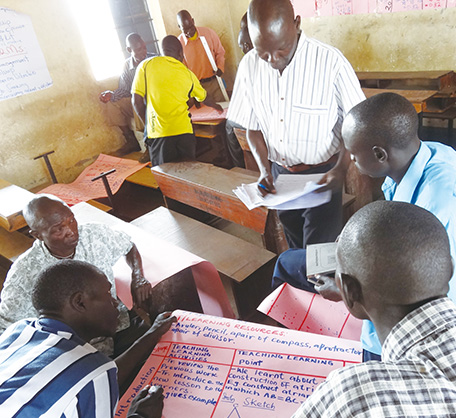
Training participants discussing course plans while developing a teaching plan for practical coursework training (Photo: JICA)
●Laos
Basic Education Improvement Program
Technical Cooperation Project, Grant Aid (September 2012 – Ongoing)
The Government of Laos has set targets to graduate from the Least Developed Country (LDC) status by 2020 and to achieve the MDGs with a deadline of 2015. In the field of education, the Government aims to expand fair access to education (equal access of all to education), improve the quality of education, and strengthen planning and operational capabilities.
To make strides in improving and strengthening access to education, quality of education, and planning and operational capabilities at every level from the central government to the provincial, district and community levels, Japan has been providing supports through this program.
Under this program, approximately 170 primary and junior high schools have been newly built, refurbished, or expanded in southern Laos through Japanese Grant Aid since 2008, enabling approximately 25,000 students to attend classes in improved environments.
A general understanding pervades among students and teachers in the educational sector in Laos that science and mathematics are complex and difficult to understand. Therefore, Japan is carrying out the Technical Cooperation Projects “Project for Improving Science and Mathematics Teacher Training” and “Project for Improving In-service Teacher Training for Science and Mathematics Education.” Through these projects, Japan is assisting with improving the instruction methods utilized by trainers of science and mathematics teachers at teacher training schools, and with ensuring that a sustainable teacher training system takes hold at schools. In this way, Japan contributes to improving the quality of science and mathematics classes.
Furthermore, to strengthen the operational capabilities of central and local education administration authorities for improved access to primary education and enhanced quality of education, Japan is providing supports to over 16 districts through the Technical Cooperation Project “Supporting Community Initiatives for Primary Education Development in the Southern Provinces” and its follow-up projects.
(As of August 2013)
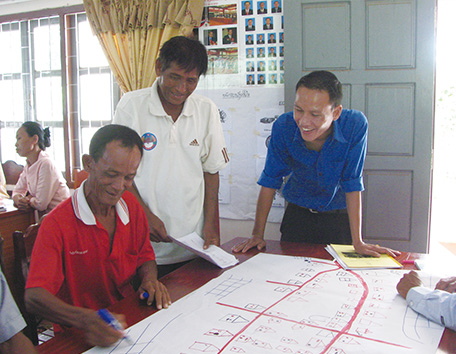
At a training workshop for the village education development committee in Mounlapamok District, Champassack Province. A village education map being drawn to gauge the whereabouts of preschool children in the village. (Photo: Naoko Tateno)
